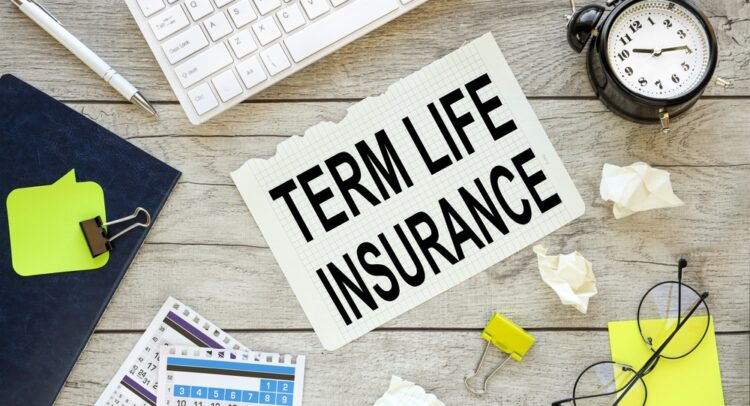Every type of insurance is designed to protect us from future expenses as a result of an incident. Life insurance is no different, though in this case the payment would occur after your death and would be used to support the ones you leave behind. Term life insurance tends to be the most economical option, and understanding the terms and conditions can help you decide if it is the right policy for you and your family.
Claim 50% Off TipRanks Premium
- Unlock hedge fund-level data and powerful investing tools for smarter, sharper decisions
- Stay ahead of the market with the latest news and analysis and maximize your portfolio's potential
There are many different types of life insurance–including whole life insurance–and deciding between the various options can be difficult. Like any investment decision, it comes down to balancing current costs with your long-term horizon.
TipRanks is partnering with BestMoney to help you find the best life insurance offer for you. Click here for your personalized offer.
What is Term Life Insurance?
Term life insurance is a relatively straightforward transaction, and has similarities to homeowners insurance and auto insurance. In those cases, in exchange for regular premiums, an insurance company will agree to offset most or all of the costs of damage or an accident. The hope is that these events never comes to pass, and that your policy will only serve to give you peace of mind.
Term life insurance functions according to the same principle. An insurance agent will look at your information, including your age and health risks (you will typically undergo a physical). Based on the predefined death payment amount, you will enter into a contract to pay a regular premium to the insurance company for your life to be insured for a set period of time, generally between 10-30 years.
For many individuals–especially for those with children–there are plenty of monthly expenses that eat up their budget. Therefore, costly whole life insurance payments can strain finances or are simply out of reach. Instead, term life insurance is an economical solution that will make sure that your family is protected in the event of your death.
Hopefully, you will outlive your policy and your family will not receive a death payment. But, in the instance that the catastrophic occurs, your family will receive financial compensation to help them continue with their lives in your absence.
Understanding the Death Payment
Term life insurance allows you to cover your family for a relatively low, regular (usually monthly) fee.
Figuring out the death payment that you would want is another matter. Many people choose to simply take their current salary and multiply it by a factor of 10 to arrive at their desired death payment. This is known as the 10x Rule.
Another commonly used mechanism is the DIME approach, whereby you will look at your current and future Debts, Income, Mortgage, and Education expenses. According to this formula, you will reach your death payment by adding your existing debts, your current salary and an estimate for how long your dependents will need this income, your remaining mortgage obligations, and expected future education costs for your dependents.
Of course, the higher your agreed-upon death payment, the larger your premium payments will be.
What are the Disadvantages of Term Life Insurance?
The disadvantage of term life insurance is that it ends. In other words, if it is never activated you will not recoup any of the money you have paid to the insurance company. This is a marked contrast to whole life insurance, whereby there is always a guaranteed death benefit for your dependents.
In this way, term life insurance functions in a model resembling home and auto insurance. With these examples, assuming your policy ends without any incident, you will not receive compensation. In other words, you will have spent a sizable amount of money ($30 a month for 30 years could have gained a decent amount of compound interest) with nothing to show for it financially. The benefit of remaining alive and kicking, however, is nothing to look down upon!
Who Should Buy Term Life Insurance?
Term life insurance tends to be most appropriate for those who do not have the ability to pay for more expensive forms of permanent life insurance.
Parents of children are prime candidates for this type of policy, as it will allow them to ensure that their family is protected for a fairly minimal monthly fee. Creating a death benefit can reassure parents that if they die, their children will have enough money to see them through college and begin supporting themselves.
In case of death, a term life insurance benefit can be used by the beneficiaries to pay off debts, take care of funeral expenses, and allow your family to begin navigating life after you are gone. Thus, there is a solid financial argument for purchasing this type of policy, even if you never end up using it.
Conclusion: Balancing Current and Future Costs
Deciding which life insurance policy to purchase is about striking a balance between current costs and the uncertain future.
While whole life insurance will offer permanent protection for your family, it also can be prohibitively expensive for many. By offering a more limited coverage, term life insurance also decreases premium payments to a level that is much more affordable. However, it could also leave you without any eventual payment.
Balancing the trade-offs is an inherent part of every financial transaction. Understanding whether you are comfortable with the terms of term life insurance can help you decide if it is the right fit for you, and more importantly, for your family.
Learn money management, and use data-driven stock insights with TipRanks.
















